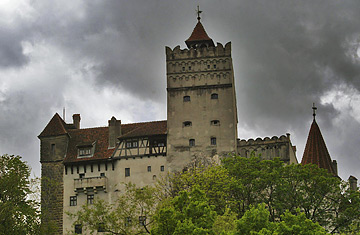
Bran Castle, Romania
Set dramatically on top of a sharp rock in the forested Carpathian mountains not far from the picturesque medieval Romanian town of Brasov, Bran Castle looks straight out of a fairy tale. But its beauty alone does not explain the fervor of the debate over its ownership. The myth-shrouded castle is also known as Dracula's Castle: according to legend, Vlad "The Impaler" Draculae, a local ruler known for his cruel torture methods (the story goes he liked to have his dinner while watching his opponents painfully die on a stake) used to inhabit Bran Castle. This, however, is merely a myth, which has its roots in the famous novel by Bram Stoker, and no one knows for sure whether the local ruler ever actually set foot in the castle. Still, on the rumor, 450,000 tourists visit it each year. Now it has become the subject of an escalating political dispute in Bucharest.
In 1948, the castle was seized by the Communist regime from the heirs of its original owner, the great-granddaughter of Britain's Queen Victoria, Princess Ileana. After the Iron Curtain fell, her heirs petitioned for the castle to be returned. Last year Ileana's son, Archduke Dominic von Habsburg-Lothringen, 63, was finally successful. Under an agreement between his lawyers and the government, Habsburg was returned the castle in exchange for an agreement to keep it open as a museum until 2009 and give the government the right of the first refusal if he chose to sell it.
But earlier this year, Habsburg put the castle up for sale, with an asking price of $100 million. Now opposition parties in parliament have responded by attempting to annul the original agreement that handed him back the castle. In a resolution last week they found the original deal null and void. The case is now likely to go to the supreme court.
The case has triggered a major political battle in the Romanian capital. Members of the governing coalition regard the restitution of the castle as compensation for the injustice that the Habsburg family suffered under the communists and see the Parliament's demand to nullify the restitution as a relapse into the communist era: "This decision is an embarrassment for the Romanian Parliament," Marton Arpad, MP for the Democratic Union of Hungarians in Romania (UDMR) told TIME: "We fought 17 years to get away from Communism, now we seem to be going straight back." He called the vote in parliament a "violation of the constitution that will set Romania back years".
Culture Minister Adrian Iorgulescu accused the opposition of "amateurism, populism and demagoguery." The opposition insists that the heirs will be able to keep the castle provided that the agreement is executed in a proper fashion. "Romania does not want to to take back the castle, says Dumitru Puchianu from the center-right Democratic party. "If the royal house has a strong, solid argument they will get it back."
The Archduke, who spent the first four years of his life in the castle, seems to be no less emotional about the matter. In a letter addressed to parliament, he stated: "I live once more with the feeling of dread in which I once lived as a child, when my family and I were forced out of our home and thrown into the streets in midwinter." He called the attempt to take the castle away from him a "dreadful injustice." His lawyers said they will sue the Romanian state for $200 million.
The matter is expected to be settled by the Constitutional Court within the course of next month. No matter what the outcome, tourists will probably continue to splurging on plastic fangs, Dracula T-shirts and mugs.
with reporting by Mihai Radu
